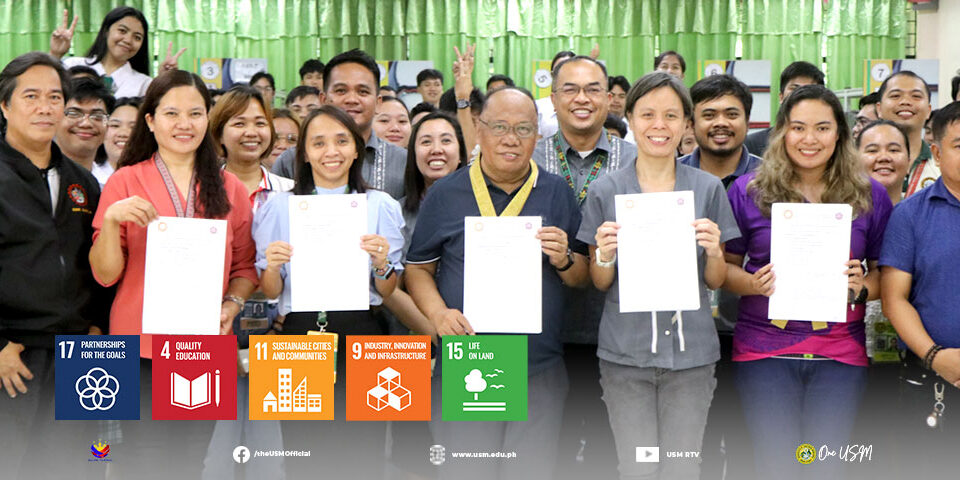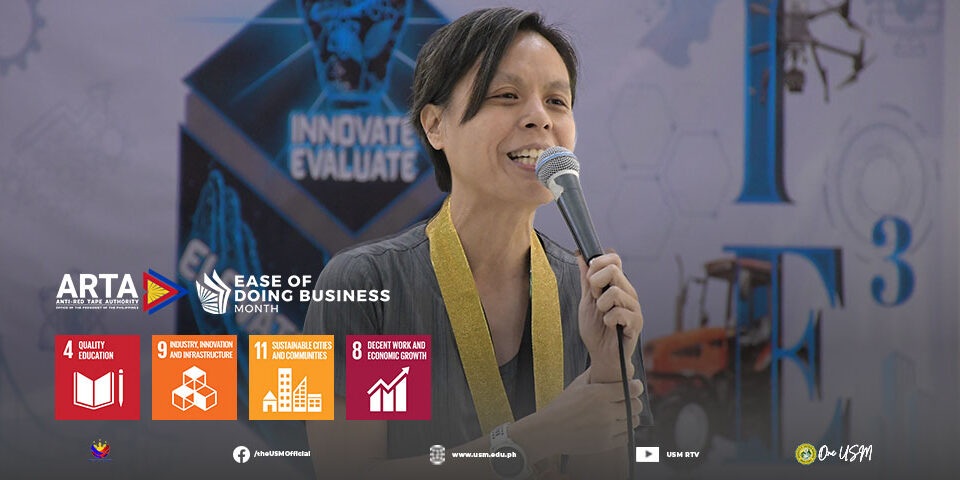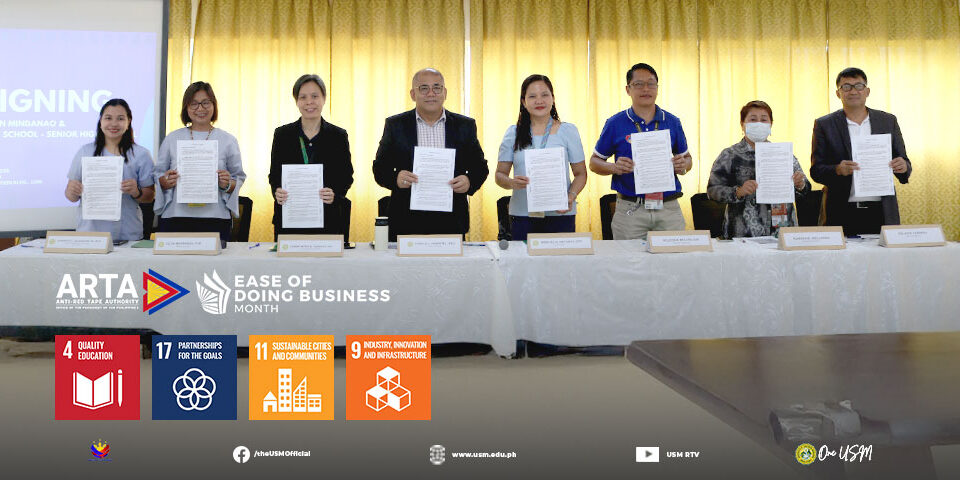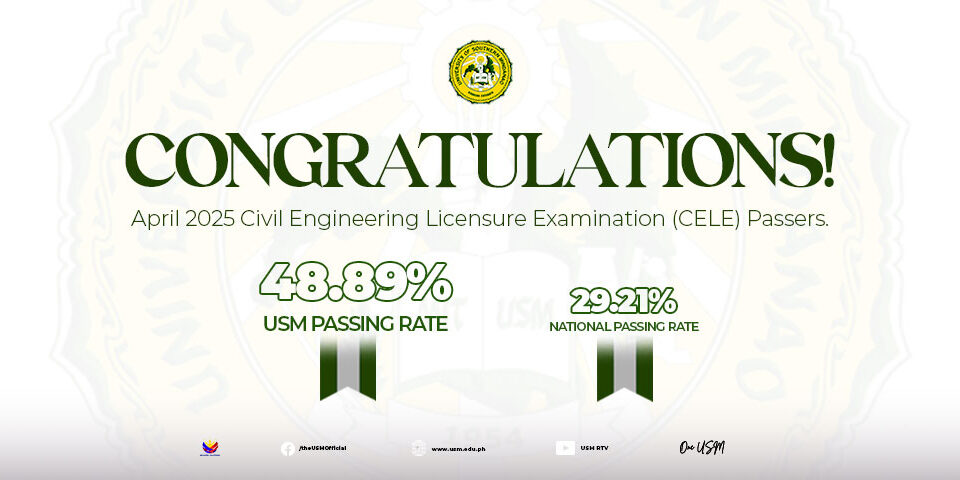
The college has evolved from a Department of Agricultural Engineering into a College of Engineering when the Mindanao Institute of Technology was converted into a University on March 13, 1978. The Bachelor of Science in Civil Engineering (BSCE) was offered in 1983 followed by the Bachelor of Science in Computer Science (BSCS), Bachelor of Science in Computer Engineering (BSCpE), and Bachelor of Science in Information Management (BSIM) were offered in 1997 and 2003, respectively. The college was renamed as College of Engineering and Computing (CENCOM) during the deanship of Dr. Rommel G. Tangonan.
The pioneering program was the Bachelor of Science in Agricultural Engineering (BSAE). It was approved in principle during the 42nd meeting of the Board of Trustees of the then Mindanao Institute of Technology held at Jade Vine Hotel, Manila on September 23, 1964. The first batch of the BSAE started in the School Year 1968-1969 pending its approval on December 13, 1968 during the 55th meeting of the BOT at Sunya Aristocrat Restaurant, Manila.
The Department of Agricultural Engineering was initially headed by Engineer Edilberto N. dela Torre, an electrical mechanical engineer in 1968. Due to his untimely death, the leadership of the department was passed on to Engr. Alfredo C. Pepito who served as chairman from April 1969 to May 1970. Engr. Benjamin F. Fortinez assumed the leadership of the department when Engr. Pepito went on study leave on June 1970. When MIT became a university in 1978, Engr. Fortinez became its first Dean of the College of Engineering with the following successors: Dr. Eustaquio Bayotlang (1988-1950); Dr. Rufino Garzon (1995-1998); Dr. Rommel G. Tangonan (1998-2009); Dr. Herminigildo Gutierrez (2009-2010). Dr. Nelson M. Belgira assumed deanship on November 2, 2010 until his retirement on July 31, 2018 serving the college for two terms. He was then succeeded by Prof. Alberto Arellano on August 2, 2018 to date.
The college is committed to produce graduates of higher education in engineering and information technology in this part of the country. Presently, the college has six degree programs namely: BSABE, BSCE, BSCpE, BSECE, BSCS, BS InfoSys and BLIS from 1973 up to the present. The college has already produced leaders and professionals holding positions in both government and private agencies as chief executive officers, middle managers, and even CEOs of their own businesses. It has also produced a number of academicians, instructors, professors, vice presidents, deans in private and government institutions and the latest of whom are presidents of ASSCAT in Agusan del Sur, Dr. Virgilio Garcia and the incumbent USM President Dr. Francisco Gil N. Garcia. Other graduates of the college work as technicians and/or specialists abroad.
Looking at the trend of the college’s licensure passers in both its CE and AE programs, a very notable improvement in the result is very possible because from 29% in 2010, it rose to 40% in 2011 and even jumped to 44.83 in 2012. These results are credited to the concerted efforts of the university administrators and the professors who work collaboratively to achieve the following AACUP Accreditation levels: BS Agricultural Engineering (level III), BS Civil Engineering (level II), BS Computer Science (level I), BS Computer Engineering and BS EcE recently passed the prelim survey and the BS Information Systems, now candidate for level I.
Deans Since 1978
| Name | Year |
|---|---|
| Engr. Benjamin F. Fortinez Sr. | 1978 - May 1988 |
| Dr. Eutaquio Bayotlang | June 1988 - May 1995 |
| Dr. Rufino S. Garzon | June 1995 - December 1998 |
| Dr. Rommel G. Tangonan | December 1998 - May 2009 |
| Dr. Herminigildo Gutierrez | June 2009 - October 2010 |
| Dr. Nelson M. Belgira | November 2, 2010 – July 31, 2018 |
| Engr. Alberto Arellano | August 1, 2018 – Present |
GOALS
The USM College of Engineering and Information Technology is committed to provide university education in agricultural engineering, civil engineering, and computing; meet the community’s need for trained manpower in engineering and various technical and managerial capabilities, and conduct researches and extension activities geared towards the amelioration of the region and the community at large.
OBJECTIVES
The College of Engineering and Information Technology aims to become one of the premier institutions of engineering and information and communications technology in the country within five years. To achieve this, it pushes to pursue the following courses of action:
- Improve the quality of its graduates specifically in terms of performance in licensure exams and employability;
- Increase books, other library acquisitions, and equipment; and improve student facilities to conform with national and international standards;
- Increase opportunities for trainings and graduate studies among faculty and staff members;
- Conduct more research, extension and income generation activities as well as publication of the results of such activities, all in support of the instruction function of the college; and
- Strive to attain optimal efficiency in expenditure and the conduct of other administrative activities of the college.
The institution of agricultural engineering program of USM is one of the program focus of UNESCO in the Mindanao Institute of Technology(MIT) in response to the growing need of professionals to help accelerate rural development. As such, several UNESCO experts have helped in the conceptualization and eventual implementation of the program. However, so as to meet the demands of the ever-changing digital and engineering world, two of the CEIT courses have been changed from BS Agricultural Engineering to BS in Agricultural and Biosystems Engineering while the Bachelor of Electronics and Communication Enginnering is shortened to Bachelor of Science in Electronics Engineering (BSEE).
The BSABE program is designed to produce graduates who possess knowledge, skills and attitudes in the application of engineering science and design process and systems involved in the sustainable production, post production, and biological materials; the efficient utilization, conservation, and management of natural and renewable resources; and development of climate change mitigation measures, in order to enhance human health and harmony with the environment. Agricultural and Biosystems consist of crops, poultry, livestock, fisheries and aquaculture resources and climate.
The graduates of BSABE are expected to apply engineering sciences and designs to identify, analyze and create solution for problems concerning lang development; irrigation and drainage including dams, farm roads, and bridges; AB production machinery; new and renewable energy; AB building and structure; postharvest and processing technologies; climate change, and natural resources, environmental and waste management.
Majors/Specialization
- *AB Land and Water Resource Engineering
- *AB Machinery and Power Engineering
- *AB Process Engineering
- *AB Structures and Environment Engineering
Program Objectives
The University of Southern Mindanao Agricultural Engineering program aims to:
- To produce agricultural engineers that can demonstrate competence in methods of analysis involving use of mathematics, fundamental physical and biological sciences, engineering sciences, and computing needed for the practice of biological systems engineering in food, fiber, energy, and environmental companies and agencies.
- To train students to develop skills necessary in the design process including the ability to think creatively, to formulate problem statements, to communicate effectively, to synthesize information, and to evaluate and implement problem solutions.
- To prepare the students in addressing issues of ethics safety, professionalism, cultural diversity, globalization, and environmental impacts in engineering practice.
- To produce professionals that can demonstrate continuous professional and technical growth, with practical experience, so as to be licensed as a professional engineer or achieve that level of expertise.
- To produce graduates who can demonstrate the ability to:
-
- be a successful leader of multi-disciplinary teams,
- efficiently manage multi simultaneous project, and work collaboratively,
- implement multi-disciplinary systems-based solutions,
- apply innovative solutions to problems through the use of new methods and technologies,
- contribute to the business success of their employee, and
- build community.
BSCpE aims to develop graduates of the program to have a strong background in mathematics, natural physical and allied sciences. also, it contains complementary courses such as general education courses to ensure that the graduates are articulate in the nature of their role and impact of their work in the society and environment. The BSCpE curriculum is designed to guarantee breadth of the knowledge of the discipline through a set of professional courses and ensure depth and focus in certain disciplines through cognate/tracks. also, it develops student’s ability to use modern tools necessary to solve problems in the field of computer engineering.
Objectives
This program holds the ability to design a system, component, or process to meet desired needs within realistic constraints such as economic, environmental, social, political. ethical health and safety, manufacturability, and sustainability, in accordance with the required standards
The BS Computer Science program includes the study of computing concepts and theories, algorithmic foundations and new developments in computing. The program prepares students to design and create algorithmically complex software and develop new and effective algorithms for solving computing problems.
The program also includes the study of the standards and practices in Software Engineering. It prepares students to acquire skills and disciplines required for designing, writing and modifying software components, modules and applications that comprise software solutions (CMO No. 25 S. 2015)
Program Objectives
The Computer Science program aims:
- To develop students to become versatile, competitive, responsible individuals so that they may be able to address issues affecting the economy, safety, globalization and ethics.
- To train students in acquiring technical skills and knowledge on the concepts of theories; algorithm foundations, abstract and analytical processes, trends in ICT and other computer science related areas;
- To produce IT professionals who are:
- proficient in designing, developing, and implementing computer based solutions;
- able to apply fundamental concepts as problem solvers
- able to recognize and apply technical standards and interoperability; and
- able to practice their profession with high regard on the quality standards and ethical values
- To mold the students to become socially aware by involving them in research and extension activities as integration knowledge learned from the different areas of computer science.
The BS in Electronics and Communications Engineering programs aims to train the students to integrate available and emerging technologies which focuses on the conceptualization, design and development of electronic, computer and communication products, system, services and processes.
Program Objectives
The objectives of the program are:
- To provide the student with an education in the fundamentals of electronics engineering that will allow him to be immediately competitive in the industry or in graduate work while providing him the best opportunity for achieving his full potential during his lifetime;
- To develop a sense of professional responsibility and social awareness; and
- To provide practical applications as evidenced by laboratory, design, project study, computer exercises and practicum courses which would help the student to work well whether independently or as part of a group.
The BS Information System program includes the study of application and effect of information technology to organizations. Graduates of the program should be able to implement an information system, which considers complex technological and organizational factors affecting it. These include: components, tools, techniques, strategies, methodologies, etc.
Graduates are able to help an organization determine how information and technology-enabled business processes can be used as strategic tool to achieve a competitive advantage. As a result, IS professionals require a sound understanding of organizational principles and practices so that they can serve as effective bridges between the technical and management/users communities within an organization. In so doing, they ensure that the organization has the information and the systems it needs to support its operations. (CMO No.25 S. 2015)
Program Objectives
The Information Systems program aims:
- To develop students to become versatile, competitive and responsible graduates in the field of information technology.
- To prepare students to become proficient in design and implementation of solutions that integrate information technology with business processes and management. To train students to acquire competencies on technical understanding specifically in:
- information abstraction, representation and organization;
- computing architectures and delivery systems;
- concepts of information and systems distribution;
- information management and system development; and
- computing tools in knowledge application
- To develop students in acquiring skills on personal discipline, critical thinking and ethical thinking so that they may become productive and competitive human resources;
- To encourage the faculty and students in conducting research, community involvement and extension services as to make them aware of their social responsibility.
Bachelor of Library and Information Science (BLIS) is an interdisciplinary field that applies the practices, perspectives and tool of management, information technology, education and other areas to libraries/ information centers/ learning resource centers: its collection, dissemination and use. BLIS curriculum is designed to equip the professional with the composite knowledge, skills and tools to enable him/her to be responsive to the changing information needs of society.
Department of Agricultural and Biosystems Engineering Faculty
| Name | Highest Educational Attainment | Specialization |
|---|---|---|
| Alucilja, Renel M. | Master of Science in Agricultural Engineering | |
| Ascaño, Tomasito C. | BS in Agricultural Engineering | |
| Belgira, Nelson M. | PhD in Physics | |
| Gamido, Joy Sharon B. | ||
| Marasigan, Crisostomo S., Jr. | ||
| Ocreto, Melanie B. | ||
| Ortiza, Shieryl P. | ||
| Painagan, Marilyn | ||
| Saliling, Willie Jones B. | Master of Science in Biological and Agricultural Engineering | Land and Water Resources Engineering, Environmental Quality Engineering, Sustainability Science, Disaster Risk Reduction |
| Tolentino, Nemesio M. | ||
| Delson, Alvin | ||
| Martin, Jean |
Department of Civil Engineering Faculty
| Name | Highest Educational Attainment | Specialization |
|---|---|---|
| Alucilja, Kathleen Mae B. | Master in Information Systems | |
| Amilbahar, Saque J. | Master in Engineering Program - Civil Engineering (on-going) | |
| Benito, Cristoper A | Master of Science in Teaching Mathematics | |
| Dapun, Bernadeth V. | Master in Engineering - Rural Infrastructure (on-going) | |
| Garbin, Ronald A. | Master of Science in Civil Engineering - (Candidate) | |
| Mantawil, Chrislam S. | Master in Information Management |
Department of Electronics and Communications Engineering Faculty
| Name | Highest Educational Attainment | Specialization |
|---|---|---|
| Dayaday, Maricel G. | Doctor in Technology Education - Candidate | |
| Ulep, Geraldo P. | Doctor in Educational Management - Candidate | |
| Pelaez, Juneph F. | MS in Electrical & Electronics Engineering - Major in Robotics & Image Processing (Candidate) | |
| Piamonte, Jerry | MA in Engineering Education-ECE | |
| Toledo, Marc Macbeth M. | Master of Science in Electrical Engineering - Major in Microelectronics | 1. Analog and Digital IC Design, Layout and Fabrication 2. Microcontroller and Robotics |
Department of Computer Engineering Faculty
| Name | Highest Educational Attainment | Specialization |
|---|---|---|
| Cordero, Melecio A. Jr. | Master in Information Management | |
| Pascua, Floreey Mae F. | Master in Information Management | |
| Lunod, Jeannalen P. | Master in Engineering - Major in Computer Engineering | |
| Serquiña, James P. | Master in Information Management | |
| Shyrill D. Ogoc | Master of Engineering - Major in Electronics Communication Engineering |
Department of Computing and Library Information Science Faculty
| Name | Highest Educational Attainment | Specialization |
|---|---|---|
| Agbunag, Arjay S. | Master in Information Systems | Web Development |
| Alcala, Astrofil Hyde M. | Master in Information Management | |
| Arellano, Alberto C. | Master in Statistics | |
| Arrogante, Ariel P. | ||
| Catulong, Genevive P. | ||
| Clarito, Lilian M. | ||
| Corpuz, Nor-Aine M. | Master in Information Science (CAR) | |
| Daffon, Catherine C. | Master in Information Technology (Candidate) | |
| Flores, Danilyn A. | Master in Information Technology | |
| Garcia, Dielita M. | ||
| Genotiva, Elizabeth R. | Master in Information Technology | |
| Lorilla, Joseph C. | Master in Information Management | |
| Martinez, Susan S. | ||
| Mibalo, Alvin C. | Master in Information Management | |
| Oliva, Virgilio P. Jr. | Master in Information Management | |
| Palmaera, Janice T. | Master in Information Management | |
| Ranjo, Eugene G. | Master in Information Management | |
| Sornito, Anita C. | PhD |
News and Updates
USM BSABE Program Goes Through PRB Inspection, Monitoring
The Bachelor of Science in Agricultural and Biosystems Engineering (BSABE) program of the University of Southern Mindanao (USM) went through the inspection and monitoring of the […]“Reflect on your Ikigai”: Dr. Verzosa Noted at CEIT Exhibit, Techno-Pitch, In-House Review
Serving as the guest of honor and speaker, Dr. Debbie Marie Verzosa, Vice President for Research, Development, and Extension (VPRDE) of University of Southern Mindanao (USM) […]USM, Carmen NHS-SHS Sign MOA
The University of Southern Mindanao (USM) and Carmen National High School- Senior High School (Carmen NHS-SHS) signed a Memorandum of Agreement (MOA) on May 6, 2025, […]USM Produces 22 New Civil Engineers
The University of Southern Mindanao (USM) celebrated its 22 passers in the April 2025 Civil Engineering Licensure Examination (CELE) recording an overall passing rate of 48.89%, […]USM Launches Free, Open Source Software Bazaar
The University of Southern Mindanao (USM) through the College of Engineering and Information Technology (CEIT) launched the Free and Open Source Software (FOSS) 2025 Bazaar: “Open […]





